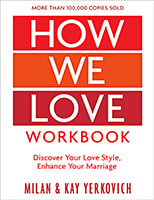Last month we started sharing excerpts and principles from Milan & Kay Yerkovich’s book titled, “How We Love”, which examines the connection between our childhood experiences and how we give and receive love as adults. We talked about why every marriage gets stuck sometimes and asked a pivotal question—“Can you recall being comforted as a child after a time of emotional distress?” We listed three key aspects of healthy emotional comfort—touch, listening, and relief.
But what if you don’t have a memory of comfort?
That’s what I want to talk about this month.
If you can’t recall a specific memory of being comforted, you’re not alone. Roughly 75 percent of adults surveyed do not have a single memory of receiving comfort from a primary caregiver when they were children. That doesn’t mean we weren’t comforted during our early years and just can’t remember it. But if we don’t have a conscious memory of comfort from our childhood and if we rarely experienced relief from our families who taught us how to relate to people, then we are missing some important experiences to bring into our marriage.
“When emotional connection is lacking, you learn to restrict emotions and minimize what’s bothering you, and you will not expect relationships to offer comfort.”
I am one of those 75 percent who can’t remember a single instance of being comforted in my childhood. In fact, I can’t remember even being held by my parents. If your parents had difficulty noticing and soothing your distress like mine, you probably grew up in a family with little emotional connection. When parents are either unaware of their own feelings or unable to express them appropriately, they will struggle to form a healthy emotional connection with their children. Without realizing it, your mom and/or dad most likely discouraged the expression of certain emotions or responded poorly to your feelings. (If that’s the case, your parents probably didn’t experience meaningful connections within their own families growing up.) When emotional connection is lacking, you learn to restrict emotions and minimize what’s bothering you, and you will not expect relationships to offer comfort. After all, it’s hard to expect something you’ve never experienced. Most people who grew up with a lack of emotional connection have no idea what they’re missing.
Let me just say here that it’s important to realize most of our parents did the best they could with the tools they had. The goal here is not to find fault, but to gain a realistic picture of what was healthy and what was not in your early childhood so you can begin a healing journey toward growth and maturity.
So, why is comfort such a big deal?
Memories of comfort are a strong indicator you were imprinted by your early experiences to express feelings, seek connection, and expect relief when life gets bumpy. As an adult, when you are upset, you seek relief through relationships. It is natural for you to go to your spouse for comfort. If you experienced a lack of emotional connection and a lack of comfort as a child, your reality as an adult is quite different. Your first inclination when distressed is not to seek comfort in relationships or your spouse, but perhaps to find comfort in things (shopping, possessions, etc.), or activities (video games, TV, hobbies, addictions, etc.), or yourself (isolation, self-reliance).
Whatever one’s childhood experience, the resulting imprint of intimacy creates a way of relating called a love style. Our love style is the way we approach relationships. People with a secure love style are comfortable making emotional connections and have the ability to form close bonds with others in a way that feels natural. For the rest of us who never experienced comfort and healthy emotional connection during childhood, Milan & Kay have identified four love styles that impair how we love others, especially our spouse. They are: The Avoider Style, The Pleaser Style, The Vacillator Style, and The Chaotic (Controller & Victim) Style.
Are you beginning to see the importance of genuine emotional connection within your marriage? And had you ever considered comfort such a key ingredient in marriage? The ability to console and bring relief to your spouse when he or she is distressed and agitated is foundational to a close, emotional bond.
Next month, we will explore the different “Love Styles” that impair how we love.
This month’s post is adapted from the book, “How We Love” by Milan & Kay Yerkovich. They also have a companion workbook to help you bring lasting change to your marriage relationship through exercises and questions that did deeper into the principles shared in the book. If you want more than insight and head knowledge, I recommend reading the book and going through the workbook with your spouse. You should get one workbook for each of you since you will be filling it out and have different answers.













Leave A Comment
You must be logged in to post a comment.